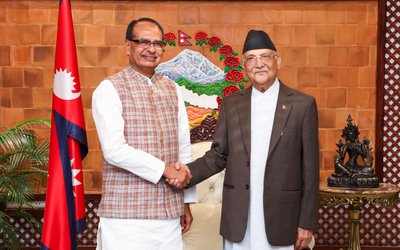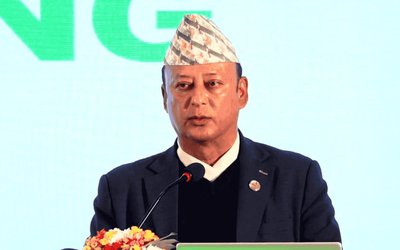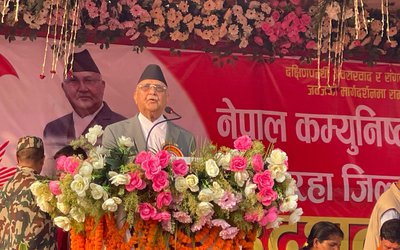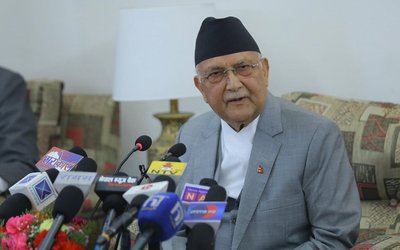More on National





Nepal is full of diversity. From the number of ethnic groups to the number of linguistic groups and from topographical diversity to diversity in flora and fauna, Nepal has a range of experiences in diversity and difference. Nepal has big neighbors with two different political systems. India is federal in nature with a strong center and China is a unitary state with federal ingredients in its structure.
Nepal is writing a new federal constitution and debating its contents. The Interim Constitution has declared Nepal as a federal democratic republic. Various thematic committees of the Constituent Assembly have submitted their reports settling the issues on the number of provinces, powers, modalities of provincial governments, legislatures, judiciaries and resource sharing. But the crux of the debates revolves around the viability of the federal models.
“The Ethiopian model has showed that federalism is not a panacea for all the problems as well as it not as bad as what many see,” said Dr. Surya Dhungel. “Given good institutional backups, federalism will also produce effective government.”
At this crucial juncture, a delegation comprising dozens of CA members representing various political parties, academicians and lawyers visited Ethiopia and participated in the 5th International Conference on Federalism. They thought the event was helpful to clear some misunderstandings and misconceptions about federalism.
“The visit to Ethiopia was very important for us. I have enriched my knowledge as well as my understanding about federalism,” said CA member Khim Lal Devkota. ” We have seen an ethnic-based federalism working in a good shape in Ethiopia. I also got an opportunity to share knowledge about various types of federal systems currently experimented in various parts of the world.”
Participating in the fifth international conference on federalism also enhanced the knowledge of CA members regarding the federal structure.
“Federalism is best for a country like Nepal where one needs to unity in the midst of diversity. I realize that only federal system can help us manage the diversity in the country like ours. I have learnt this during my recent visit to Ethiopia,” said CA member Jitendra Sonal. “Whatever one says, Nepal’s diversity is the beauty of this country which we can manage through the federalism.”
With support from the Forum of Federations and Embassy of Switzerland in Nepal, members of Constituent Assembly visited Addis Ababa, capital of Ethiopia. Along with visiting some provinces and interacting with the local members, Nepalese CA members also took part in international conference on federalism.
“After participating in the conference and visiting Ethiopia, I came to realize that federalism is for the strengthening the nation. There is the need to have more role for the center. My vision about federalism was that provinces are powerful than the center,” said Khagendra Mahakik.
“Although a section of the people are still saying that federalism will spilt the nation and encourage secessionist tendencies, the federal models including Ethiopian experiment have shown how it can strengthen the nation.”
Even after the presentation of the report by State Restructuring Committee of CA, the debate about the number of provinces, questions of power sharing and modalities of federalism are yet to be decided.
“The challenges before us are how to make federal structure functional. The conference helped us a lot to know about various models of federal system functioning around the world,” said Dr. Bipin Adhikari.
“We have learnt a lot about federalism. Our visit helped us to understand the federal structure and governments at various levels,” said CA Member Anil Kumar Jha. “The experiences of Ethiopia were noteworthy for us. Thanks to the Switzerland Embassy in Nepal, we were able to take part in the program.”
CA member Dr. Mangal Siddhi Manandhar said, “When we proposed federalism on the basis of ethic identity, many claimed that such federal structure will not work. Ethiopian experiences have taught us that federalism based on ethnic identity can strengthen the nation.”
“Different countries have different federal models and Nepal needs to select one of the models which suits it,” said scholar Mabuhang.
Tulsi Subba and Prithivi Subba Gurung of CPN-UML, Dama Sharma of UCPN-Maoist also shared their experiences. Similarly, Narshing Chaudhari of Nepal Sadbhvana Party also found the events worthy of attending.
“Every country needs its own model and one cannot copy the model of others. After listening to the experiences of participants, I came to realize that this visit will further help them in deciding the future federal model for Nepal” said Martin Stuerzinger, Senior Adviser for Peace building Embassy of Switzerland in Nepal.
“I am happy to say that this is one of the most inclusive delegations in terms of party representation, regional representation, ethnicity and gender. The delegation shared their views in international seminar as well as learned the Ethiopian model of federal government,” said Vickal Deep Khadka, program manager Nepal Field Office, Forum of Federations.
The 5th International Conference On Federalism
The International Conferences on Federalism were initiated in 1999 by the Forum of Federations with the first conference in Mt. Tremblant, Canada. This was followed by a second conference in 2002 in St. Gallen, Switzerland, a third in Brussels, Belgium, in 2005, and a fourth in New Delhi, India, in 2007.




